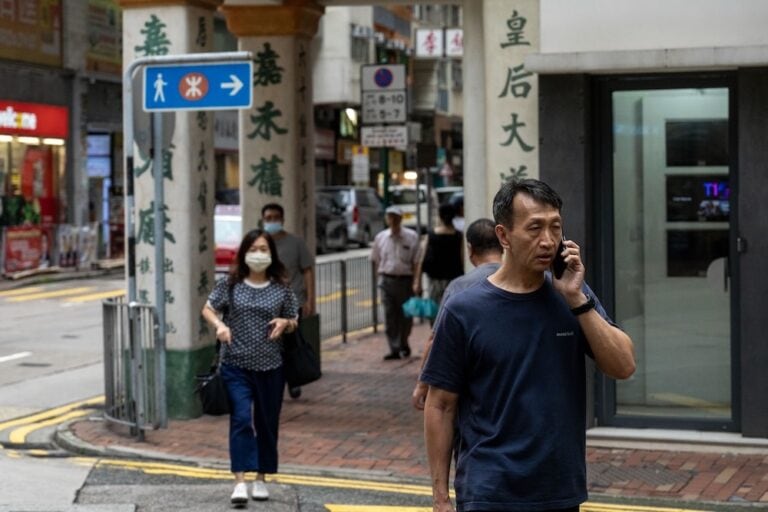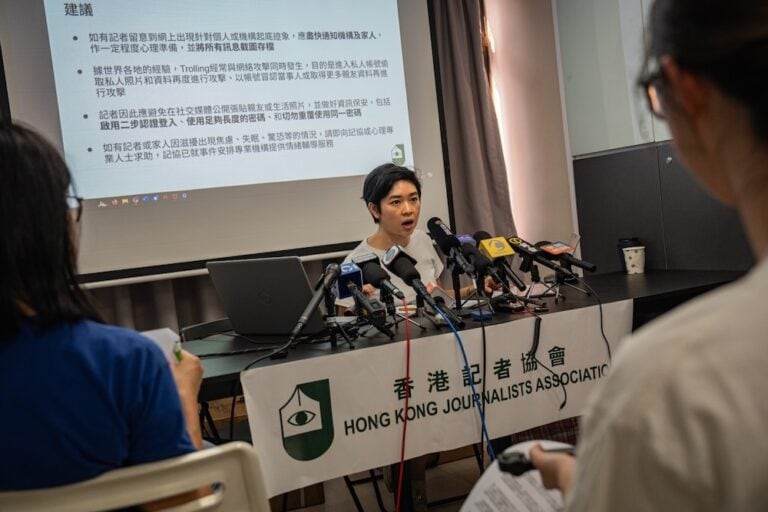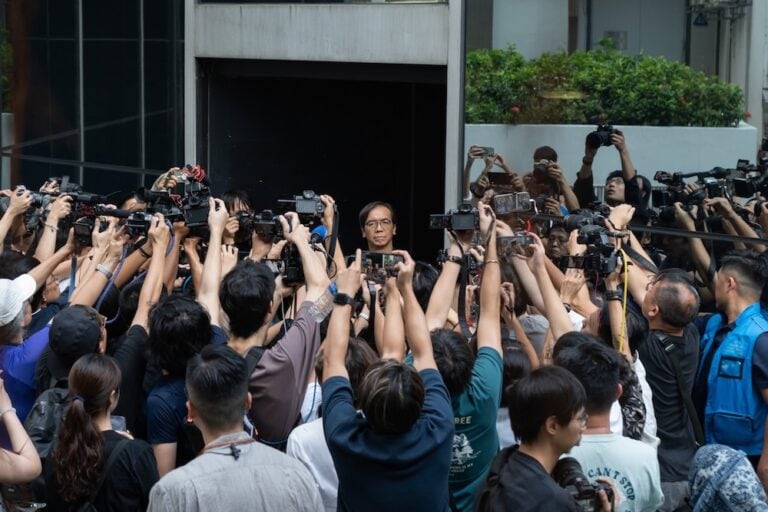A two-year timeline of how enforcement of the National Security Law led to the dismantling of Hong Kong's once vibrant civic space.
This statement was originally published on rsf.org on 23 March 2022.
Reporters Without Borders (RSF) has reconstructed an exclusive two-year timeline of government assault on Hong Kong’s press freedom following the Chinese regime’s enactment of the National Security Law in 2020.
15th April 2020 – The head of China’s liaison office in Hong Kong, Luo Huining, calls for the rapid passing of a national security law designed to eradicate the territory’s pro-democracy movement.
28th May 2020 – The National People’s Congress, China’s parliament, passes the Hong Kong National Security Law which punishes with a life sentence four vaguely-defined “crimes against the state”.
18th June 2020 – A survey by the Hong Kong Journalists Association (HKJA) reveals that 98% of local journalists fear that the National Security Law would be used against them.
30th June 2020 – The National Security Law enters into force.
10th August 2020 – Two hundred police officers raid the headquarters of Apple Daily, Hong Kong’s largest Chinese-language opposition newspaper, and its founder Jimmy Lai is detained for 40 hours on suspicion of “collusion with foreign forces”.
22nd September 2020 – The Hong Kong government announces that it will reserve its future press briefings to “internationally recognised” media only, without providing any details on the definition they will use, which de facto excludes independent media outlets and freelance journalists.
23rd September 2020 – China’s Ministry of Foreign Affairs accuses the Foreign Correspondents’ Club of Hong Kong (FCCHK) of “stirring up trouble” after it raised concerns over new police media guidelines, and calls for the club to “stop meddling” in the territory’s affairs.
2nd December 2020 – Jimmy Lai is detained again, this time for “fraud”. He will also later be charged with “collusion with foreign forces” under the National Security Law and denied bail.
6th January 2021 – Press freedom defenders and former journalists Claudia Mo and Gwyneth Ho are arrested under the National Security Law on suspicion of “conspiracy to commit subversion” and later denied bail.
1st March 2021 – Public broadcaster Radio Television Hong Kong (RTHK)’s newly-appointed Director of Broadcasting Patrick Li establishes a censorship system and threatens to halve the salaries of journalists who produce material of which he disapproves.
16th April 2021 – Apple Daily founder Jimmy Lai is sentenced to one year and two months in prison for “unauthorised assembly” and is also charged with “conspiracy to collude with foreign forces”, his second alleged offence under the National Security Law.
17th June 2021 – Apple Daily premises are raided again by police officers, several of its senior staff members are arrested, and the government freezes its parent company Next Digital’s assets. One week later, the Hong Kong daily newspaper announces that it will cease its operations.
9th August 2021 – Hong Kong’s Chief Executive Carrie Lam says public broadcaster RTHK will partner with State-owned China Media Group (CMG) to “nurture a stronger sense of patriotism” in the territory.
13th December 2021 – Press freedom defenders Jimmy Lai and Gwenyth Ho are sentenced to 13 months and 6 months imprisonment, respectively, for taking part in a banned assembly in Hong Kong in 2020.
28th December 2021 – Hong Kong prosecutors file additional “seditious publications” charges against Jimmy Lai and six former Apple Daily staffers.
29th December 2021 – Independent online media Stand News ceases its operation after a police raid on its office, on the same day during which six current and former team members are arrested.
3rd January 2022 – Independent online media Citizen News ceases its operations, citing the need to “protect its staff”. On the following day another media outlet, Mad Dog Daily, decides to shut down, citing the same reasons.
12th January 2022 – Chief Executive Carrie Lam says Hong Kong will create more national security laws to address the crimes of treason, secession, sedition, and subversion.
1st March 2022 – Independent online media Local Press announces it has ceased operation without elaborating on the reason.
14th March 2022 – Hong Kong Watch, a UK-based NGO that called for the release of detained Hong Kong journalists, receives a formal demand from the Hong Kong police to remove its website which allegedly could be “breaching the National Security Law”.
23rd March 2022 – To this date, no less than 12 journalists and press freedom defenders, including senior staff of Apple Daily and Stand News, are still in custody awaiting their trials, which have again been delayed to the coming months, allegedly due to the territory’s Covid-19 situation.
In a report titled The Great Leap Backwards of Journalism in China, published on 7th December 2021, Reporters Without Borders (RSF) revealed the system of censorship and information control established by the Chinese regime and the global threat it poses to press freedom and democracy.
Hong Kong, once a bastion of press freedom, has fallen from 18th place in 2002 to 80th place in the 2020 RSF World Press Freedom Index. The People’s Republic of China, for its part, has stagnated at 177th out of 180.



